常见动词不定式词组
常见动词不定式词组、句型用法总结

千里之行,始于足下。
常见动词不定式词组、句型用法总结动词不定式是英语语法中的一种形式,由动词原形前加上“to”构成。
动词不定式可以用作名词、形容词或副词,经常用于各种不同的句型和用法。
下面是一些常见的动词不定式词组和句型用法的总结。
1. 动词不定式作主语:例如:To learn a new language is challenging.翻译:学习一种新语言是具有挑战性的。
2. 动词不定式作宾语:例如:I want to go to the beach.翻译:我想去海滩。
3. 动词不定式作形容词的补语:例如:I am happy to help you.翻译:我很兴奋挂念你。
4. 动词不定式用于感官动词后面,表示感受:例如:I saw her cry.翻译:我观察她哭了。
5. 动词不定式用于情态动词后面,表示推想或必要性:例如:He must be busy.翻译:他肯定很忙。
6. 动词不定式用于形容词后面,表示缘由:例如:She was happy to hear the good news.第1页/共3页锲而不舍,金石可镂。
翻译:她听到好消息很兴奋。
7. 动词不定式用于介词后面:例如:I am interested in learning English.翻译:我对学习英语很感爱好。
8. 动词不定式用于短语动词的后面:例如:She wants to give up smoking.翻译:她想戒烟。
9. 动词不定式作定语,修饰名词:例如:He is a person to trust.翻译:他是一个可以信任的人。
10. 动词不定式用于条件句中,表示将来的可能性:例如:If you study hard, you will pass the exam.翻译:假如你努力学习,你会通过考试。
11. 动词不定式用于否定句中,表示不行能或不允许的行为:例如:He refused to eat the vegetables.翻译:他拒绝吃蔬菜。
动词不定式用法

动词不定式用法动词不定式是英语中的一种常见的动词形式,它被用来表示目的、意图、能力、愿望或建议等。
动词不定式通常由“to”和动词原形组成,如“to write”、“to read”、“to learn”等。
动词不定式在句子中可以作为主语、宾语、表语、定语或补语等。
一、作为主语动词不定式可以作为主语,通常用于形式主语的结构中,例如:To learn English is important for me.(学习英语对我来说很重要。
)To study hard is the key to success.(努力学习是成功的关键。
)To travel is my dream.(旅行是我的梦想。
)二、作为宾语1.作及物动词的宾语动词不定式可以作为及物动词的宾语,例如:I want to learn English.(我想学英语。
)She decided to go to Beijing.(她决定去北京。
)They plan to visit Paris next year.(他们计划明年去巴黎。
)2.作介词的宾语动词不定式可以作为介词的宾语,通常介词为“for”、“of”、“about”、“to”等,例如:She is good at singing and dancing.(她擅长唱歌和跳舞。
)3.作动词或动词词组的宾语动词不定式可以作为某些动词或动词词组的宾语,例如:He hopes to become a doctor in the future.(他希望将来成为一名医生。
)I expect to see you soon.(我期望很快能见到你。
)三、作为定语动词不定式可以作为定语,修饰一个名词或代词,例如:I need a book to read.(我需要一本书来读。
)This is a good place to live.(这是一个适合居住的好地方。
)He has a lot of work to do.(他有很多工作要做。
常见动词不定式词组、句型用法总结
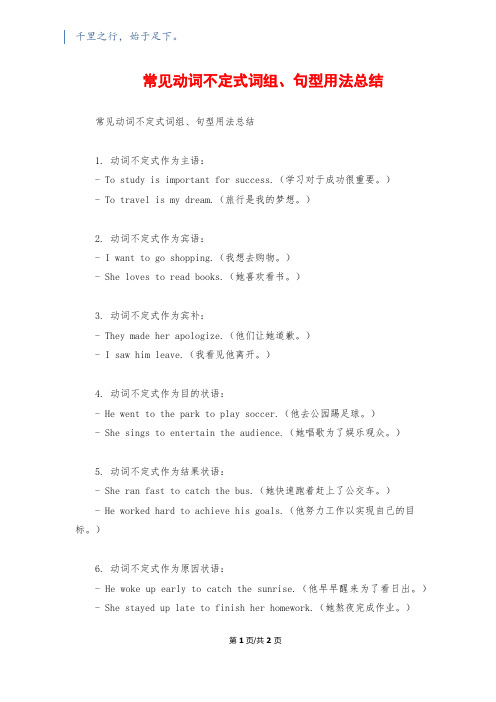
千里之行,始于足下。
常见动词不定式词组、句型用法总结常见动词不定式词组、句型用法总结1. 动词不定式作为主语:- To study is important for success.(学习对于成功很重要。
)- To travel is my dream.(旅行是我的梦想。
)2. 动词不定式作为宾语:- I want to go shopping.(我想去购物。
)- She loves to read books.(她喜欢看书。
)3. 动词不定式作为宾补:- They made her apologize.(他们让她道歉。
)- I saw him leave.(我看见他离开。
)4. 动词不定式作为目的状语:- He went to the park to play soccer.(他去公园踢足球。
)- She sings to entertain the audience.(她唱歌为了娱乐观众。
)5. 动词不定式作为结果状语:- She ran fast to catch the bus.(她快速跑着赶上了公交车。
)- He worked hard to achieve his goals.(他努力工作以实现自己的目标。
)6. 动词不定式作为原因状语:- He woke up early to catch the sunrise.(他早早醒来为了看日出。
)- She stayed up late to finish her homework.(她熬夜完成作业。
)第1页/共2页锲而不舍,金石可镂。
7. 动词不定式作为条件状语:- If you want to succeed, you must work hard.(如果你想成功,你必须努力。
)- You have to practice every day to improve your English.(你必须每天练习才能提高英语。
)8. 动词不定式作为伴随状语:- She listened to music to relax.(她听音乐放松。
常见不定式作宾语的动词
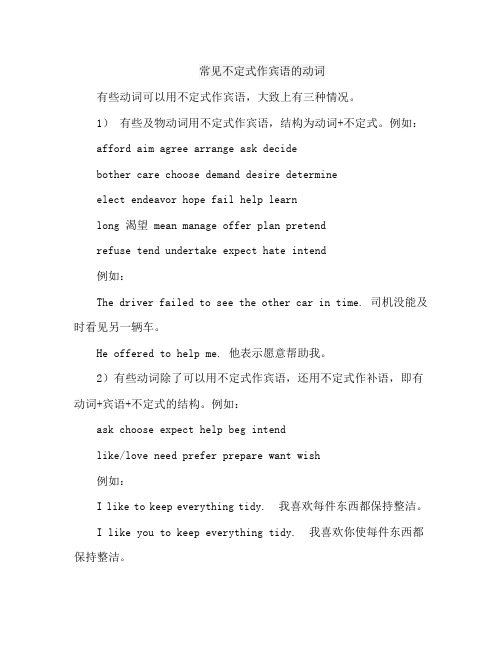
常见不定式作宾语的动词有些动词可以用不定式作宾语,大致上有三种情况。
1)有些及物动词用不定式作宾语,结构为动词+不定式。
例如:afford aim agree arrange ask decidebother care choose demand desire determineelect endeavor hope fail help learnlong 渴望 mean manage offer plan pretendrefuse tend undertake expect hate intend例如:The driver failed to see the other car in time. 司机没能及时看见另一辆车。
He offered to help me. 他表示愿意帮助我。
2)有些动词除了可以用不定式作宾语,还用不定式作补语,即有动词+宾语+不定式的结构。
例如:ask choose expect help beg intendlike/love need prefer prepare want wish例如:I like to keep everything tidy. 我喜欢每件东西都保持整洁。
I like you to keep everything tidy. 我喜欢你使每件东西都保持整洁。
I want to speak to Tom. 我想和汤姆谈话。
I want you to speak to Tom. 我想让你和汤姆谈话。
3)有些动词或动词词组可以用动词+疑问词+不定式的结构作宾语。
例如:decide know consider forget learn remembershow, wonder find out tell inquire explain例如:Please show us how to do that. 请演示给我们如何去做。
There are so many kinds of tape-recorders on sale that I can't make up my mind which to buy.。
动词不定式要点总结

动词不定式要点总结动词不定式具有名词、形容词和副词的特征,因此,在句中可以作主语、表语、宾语、宾语补足语、定语和状语。
一、常接不定式作宾语的动词有want,love,learn,agree,decide,hope,refuse 等。
例如:I'm learning to skate on real ice. 我正在真正的冰上学滑冰。
[特殊提醒]不定式短语作宾语时,如果还带有宾语补足语,通常用 it 作形式宾语,而把不定式短语放在宾语补足语之后。
例如:He found it very difficult to get to sleep.他发现入睡很艰难。
二、动词不定式常用作目的状语。
例如:He came to give us a talk yesterday. 他昨天来给我们作了个报告。
Mrs Brown went to see her doctor. 布朗夫人去看她的医生了。
三、 tell,ask,want,order,get,wish,warn,teach,invite 等动词后常跟不定式作宾语的补足语,构成 tell/ ask……sb to do sth (“告诉/请……某人做某事”)结构。
例如:Could you ask him to call me,please?请你让他给我打个电话,好吗?[特殊提醒]使役动词 let,make,have 等,感官动词 see,hear,feel,watch,notice,look at,listen to 等,后常跟不带to 的不定式作宾语补足语。
例如:A woman saw it happen when she was walking past一.位妇女路过时看到(它掉下) 了。
We often heard her sing in the next room. 我们时常听到她在隔壁唱歌。
注意:在被动语态句子中,不定式前必须加 to.例如:He was made to do it. 他被迫做这件事。
动词不定式词组
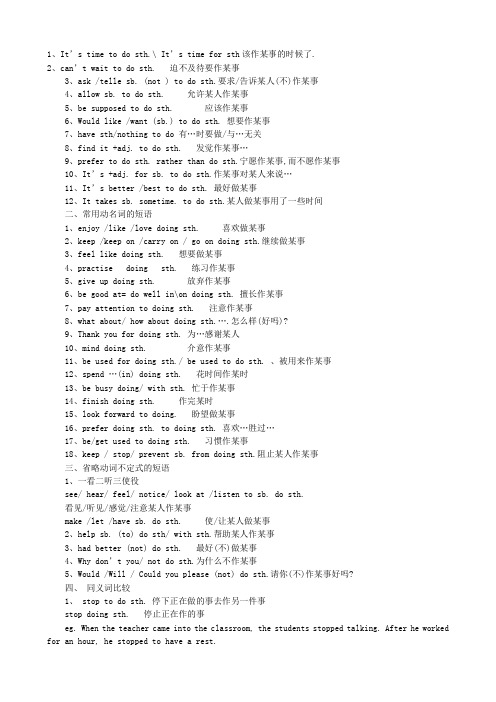
1、It’s time to do sth.\ It’s time for sth该作某事的时候了.2、can’t wait to do sth.迫不及待要作某事3、ask /telle sb. (not ) to do sth.要求/告诉某人(不)作某事4、allow sb. to do sth. 允许某人作某事5、be supposed to do sth. 应该作某事6、Would like /want (sb.) to do sth. 想要作某事7、have sth/nothing to do 有…时要做/与…无关8、find it +adj. to do sth. 发觉作某事…9、prefer to do sth. rather than do sth.宁愿作某事,而不愿作某事10、It’s +adj. for sb. to do sth.作某事对某人来说…11、It’s better /best to do sth. 最好做某事12、It takes sb. sometime. to do sth.某人做某事用了一些时间二、常用动名词的短语1、enjoy /like /love doing sth. 喜欢做某事2、keep /keep on /carry on / go on doing sth.继续做某事3、feel like doing sth. 想要做某事4、practise doing sth. 练习作某事5、give up doing sth. 放弃作某事6、be good at= do well in\on doing sth. 擅长作某事7、pay attention to doing sth. 注意作某事8、what about/ how about doing sth.….怎么样(好吗)?9、Thank you for doing sth. 为…感谢某人10、mind doing sth. 介意作某事11、be used for doing sth./ be used to do sth. 、被用来作某事12、spend …(in) doing sth.花时间作某时13、be busy doing/ with sth. 忙于作某事14、finish doing sth. 作完某时15、look forward to doing. 盼望做某事16、prefer doing sth. to doing sth. 喜欢…胜过…17、be/get used to doing sth. 习惯作某事18、keep / stop/ prevent sb. from doing sth.阻止某人作某事三、省略动词不定式的短语1、一看二听三使役see/ hear/ feel/ notice/ look at /listen to sb. do sth.看见/听见/感觉/注意某人作某事make /let /have sb. do sth. 使/让某人做某事2、help sb. (to) do sth/ with sth.帮助某人作某事3、had better (not) do sth. 最好(不)做某事4、Why don’t you/ not do sth.为什么不作某事5、Would /Will / Could you please (not) do sth.请你(不)作某事好吗?四、同义词比较1、 stop to do sth. 停下正在做的事去作另一件事stop doing sth. 停止正在作的事eg. When the teacher came into the classroom, the students stopped talking. After he worked for an hour, he stopped to have a rest.2、 forget / remember to do sth.忘记/记得要去作某事forget / remember doing sth.忘记记得曾经做过某事eg. Please remember to bring my book to school.I remember doing my homework3、 used to do sth. 过去常常作某事be used to do sth. 被用来作某事be used to doing sth. 习惯于作某事eg. My father used to smoke.Wood is used to make paper.I am used to getting up early.4、So +be/助动词/情态动词 + 主语…也一样So +主语+be/助动词/ 情态动词是呀,表示赞同别人的观点Neither + be /助动词/ 情态动词+主语…也不一样(用于否定句)eg. He has been to Beijing. So have I.It’s a fine day. So it i s.She doesn’t like eggs. Neither do I.5、too…to do sth.太…而不能…so +adj. /adv + that(从句) 如此…以致…such +(a/an +adj.)+n.+ that(从句)如此…以致…(not) enough (for sb.) to do sth.(对某人来说)做某事(不)够eg. The boy is too young to go to school.The boy is so young that he can’t go to school.He is such a young boy that he can’t go to school.The boy is not old enough to go to school.五、常考知识点1、keep +adj. 保持…状态keep (sb.) doing sth.继续做某事/使某人老是做某事eg. Everyone should keep our classroom clean.It’s too late, but he still keeps working.Lily always keeps us waiting for her.2、make+ sb. + n. 使某人成为make + sb. + adj. 使某人…make sb. do sth. 使某人做某事Sb. be made to sth. 某人被迫做某事eg. We made Peter our monitor.Books make us happy.He often makes me laugh.The workers were made to work 12 hours a day.3、I don’t think that我认为…不eg. I don’t think you are right.4、It’s /was/has been+ some time +since+一般过去时…自从…以来有多久了eg. It has been two years since we met last time.6、What do you mean by?=What does .. mean?=what is the meaning of...?是什么意思?eg. What do you mean by “computer”?=What does “computer”mean?=what is the meaning of "computer"?7、What do you think of…/How do you like …?你认为…怎么样?eg. What do you think of this film /How do you like this film?8、What is/was/will …be like? ..怎么样?eg. What is the weather like?What will the life in the future be like?9、It’s said/ reported that…据说/据报道It's well known that 众所周知It's thought that 大家认为eg. It’s said that the population of the word would be 6 billion in 2050.10、one of the +形容词最高级+名词复数…其中之一eg. Shanghai is one of the biggest cities in China.11、neither…nor… 既不…也不(两者都不),either…or…要么…要么/或者…或者/不是…就是not only…but also… 不但…而且以上三个词做主语时,要用就近原则eg. Neither you nor he has been to the USA.Either he or you go to the park.Not only my mother but also my father is a teacher.neither of 两者都不either of 两者选一none of 没有一个以上三个做主语时,谓语动词用单数All of 全部 Both of 两者都以上二个做主语时,谓语动词用复数12、比较级+ than +any other +名词单数…比其余任何一个…比较级+ than + the other+名词复数eg. Shanghai is bigger than any other city=shanghai is bigger than the other cities in China.13、When(当…的时候), if (如果), as soon as(一…就), until(直到…才), unless(除非/如果…不)这几个词引导的时间或条件状语从句时,主句要用一般将来时.从句一般现在时eg. I will call you when he comes.If it doesn’t rain tomorrow, we will have a picnic.As soon as I get to Beijing, I’ll come to see you.He won’t go to bed until his parents come back.Unless you work hard, you won’t catch up with others.。
(完整版)英语动词不定式大全

英语动词不定式大全动词不定式是一种活跃的非谓语动词.它在句中起的是名词。
形容词或副词的作用,可在句子中作主语。
宾语。
定语。
状语和宾语补足语。
动词不定式的形式是"to +动词原形",但to有时要省去。
动词不定式在具体运用时,用不用to,取决于谓语动词的用法:一。
带to的不定式结构1.我们学过的能直接跟带to的不定式结构的动词主要有:want, ask, tell, hope, learn, try, decide, forget, remember, like ,love, stop, go, come等。
2.动词不定式的否定形式是在不定式前直接加not,即not to do sth。
例如:Jim told me not to wake up Kate.吉姆告诉我别叫醒凯特.二。
不带to的不定式结构以下几种情况使用不带to的动词不定式:1。
在固定词组had better之后。
注意:had better的否定形式是had better not do sth.。
例如:You had better go home now。
你最好现在回家.It’s cold outside. You'd better not go out。
外面很冷,你最好不要出去。
2.在let,make,see, feel, watch,hear等感官或使役动词后,要跟不带to的动词不定式作宾语补足语.例如:I made them give me the money back.我迫使他们把钱还给我。
I didn't see you come in.我没看见你进来.3.在引导疑问句的why not之后。
"Why not+不带to的不定式"是Why don't you do…的省略,可以用来提出建议或劝告。
例如:Why not go with us。
为什么不和我们一起去呢。
Why not take a holiday。
常见动词不定式词组
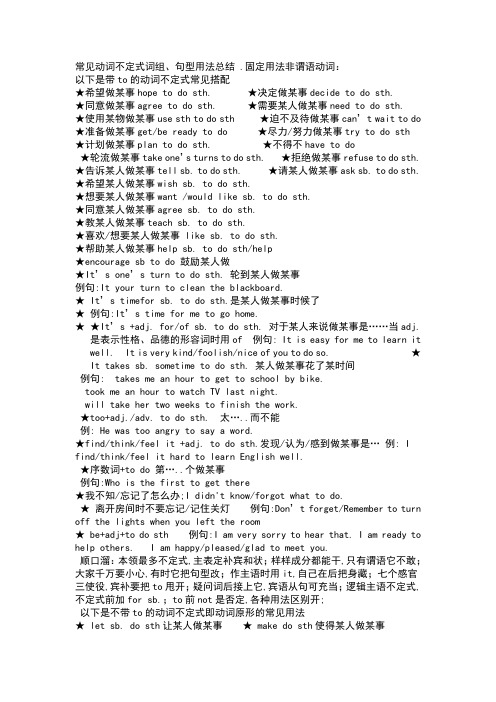
常见动词不定式词组、句型用法总结 .固定用法非谓语动词:以下是带to的动词不定式常见搭配★希望做某事hope to do sth. ★决定做某事decide to do sth. ★同意做某事agree to do sth. ★需要某人做某事need to do sth. ★使用某物做某事use sth to do sth ★迫不及待做某事can’t wait to do ★准备做某事get/be ready to do ★尽力/努力做某事try to do sth ★计划做某事plan to do sth. ★不得不have to do ★轮流做某事take one’s turns to do sth. ★拒绝做某事refuse to do sth. ★告诉某人做某事tell sb. to do sth. ★请某人做某事ask sb. to do sth. ★希望某人做某事wish sb. to do sth.★想要某人做某事want /would like sb. to do sth.★同意某人做某事agree sb. to do sth.★教某人做某事teach sb. to do sth.★喜欢/想要某人做某事 like sb. to do sth.★帮助某人做某事help sb. to do sth/help★encourage sb to do 鼓励某人做★It’s one’s turn to do sth. 轮到某人做某事例句:It your turn to clean the blackboard.★It’s timefor sb. to do sth.是某人做某事时候了★例句:It’s time for me to go home.★★It’s +adj. for/of sb. to do sth. 对于某人来说做某事是……当adj.是表示性格、品德的形容词时用of 例句: It is easy for me to learn it well. It is very kind/foolish/nice of you to do so. ★It takes sb. sometime to do sth. 某人做某事花了某时间例句: takes me an hour to get to school by bike.took me an hour to watch TV last night.will take her two weeks to finish the work.★too+adj./adv. to do sth. 太…..而不能例: He was too angry to say a word.★find/think/feel it +adj. to do sth.发现/认为/感到做某事是…例: I find/think/feel it hard to learn English well.★序数词+to do 第…..个做某事例句:Who is the first to get there★我不知/忘记了怎么办;I didn't know/forgot what to do.★离开房间时不要忘记/记住关灯例句:Don’t forget/Remember to turn off the lights when you left the room★ be+adj+to do sth 例句:I am very sorry to hear that. I am ready to help others. I am happy/pleased/glad to meet you.顺口溜:本领最多不定式,主表定补宾和状;样样成分都能干,只有谓语它不敢;大家千万要小心,有时它把句型改;作主语时用it,自己在后把身藏;七个感官三使役,宾补要把to甩开;疑问词后接上它,宾语从句可充当;逻辑主语不定式,不定式前加for sb.;to前not是否定,各种用法区别开;以下是不带to的动词不定式即动词原形的常见用法★ let sb. do sth让某人做某事★ make do sth使得某人做某事★ hearsb do sth听见某人做某事★see sb do sth看见某人做某事★ why not 或why don’t you +动词原形为什么不….表示建议例:Why not/Why don’t you take a walk★某人+had better notdo 某人最好不做某事★情态动词can/may /must /should+ 动词原形包括情态动词的否定形式+动词原形★助动词do/does/did/will/would在构成疑问句或者构成否定句即don’t /doesn’t /didn’t /will not /would not+ 动词原形★ be going to + 动词原形表示“即将”“打算”做某事★主语+及物动词+名词/代词+不带的to的动词不定式说明:用于本句型的动词不定式有两类:一是感官动词see, find, hear, notice, watch, smell, observe, look at, listen to等;二是某些使役动词,如let, make, have等;例:aI‘ve never known him tell lies.我从来没有听说他说谎;bMother let me go to camp.母亲让我去参加露营;★只能是doing sth1、 enjoy doing sth享受做某事2、 finish doing sth结束做某事3、 practice doing sth练习做某事4、 mind doing sth 介意某事5、 be busy doing sth 忙于做某事6、 have fun doing sth 很开心做某事7、 have problems doing sth 有问题做某事8、 have difficulties doing sth 有困难做某事9、 have trouble doing sth有麻烦做某事 10、 spend some time doing sth 花时间做某事11、 prefer doing sth to doing sth 更喜欢做某事 12、 be used to doing sth 习惯于做某事 13、 look forward to doing sth 盼望做某事 14、 be interested in doing sth 有兴趣做某事★只能是to do sth15、 want to do sth 想要 16、 would like to do 愿意17、 agree to do 同意 18、 refuse to do 拒绝19、 decide to do 决定 20、 plan to do计划21、 expect to do期望 22、 hope to do希望23、 wish to do但愿★to do doing 均可,但意思不一样24、 like to do sth喜欢马上去做某事 25、 like doing sth 平常喜欢做某事26、 prefer to do sth 更喜欢马上去做某事 27、 prefer doing sth 平常更喜欢做某事28、 hate to do 不喜欢马上去做某事 29、 hate doing sth平常不喜欢做某事30、 try to do sth 尽力去做某事 31、 try doing sth 试着去做某事32、 remember to do sth 记得去做某事 33、 remember doing sth 记得做过某事34、 forget to do sth 忘记去做某事 35、 forget doing sth 忘记做过某事36、 stop to do sth 停下来去做某事 37、 stop doing sth 停下正做的事★V+sb+to do sth结构38、 would like sb to do sth愿意某人去做某事 39、 like sb to do sth 喜欢某人去做某事40、 want sb to do sth 想要某人去做某事 41、 wish sb to do sth 但愿某人去做某事42、 expect sb to do sth 期盼某人去做某事 43、 prefer sb to do sth 更喜欢某人去做某事 44、 allow sb to do sth 同意某人去做某事 45、 encourage sb to do sth 鼓励某人去做某事 46、 advise sb to do sth 建议某人去做某事 47、 ask sb to do sth 要求某人去做某事48、 tell sb to do sth 告诉某人去做某事 49、 get sb to do sth使得某人去做某事50、 invite sb to do sth 邀请某人去做某事★特殊结构51、 make sb do sth让某人去做某事 52、 let sb do sth让某人去做某事53、 have sb do sth让某人去做某事 54、 help sb to do sth帮助某人去做某事55、 help sb do sth帮助某人去做某事★其他结构56、 stop sb from doing sth阻止某人去做某事 57、 stop sb doing sth阻止某人去做某事58、 keep sb doing sth让某人一直做某事 59、 keep sb from doing sth阻止某人去做某事 60、 get sth done让某事被做 61、 have it repaired让这个东东被修理62、 have my ears pierced让我的耳朵穿孔 63、 have my hair cut让我的头发被剪64、 health healthy healthily健康n 健康的adj 健康地adv65、 weight himself自已量体重 66、 daily walk每天的散步67、 monthly meeting每月的会议68、 clever bright wise聪明的adj 聪胆伶俐的adj 见多识广的adj69、 must be一定是70、 at least至少n71、 cigarette香烟n72、 hamburger汉堡n73、 chocolate巧克力n74、 wonder想知道v75、 ask for permission请求同意76、 surprisingly令人意外地adv77、 the best route最好的路线78、 as the days grow shorter and colder随着天气越变越冷79、 normally casually actually正常地adv 随意地adv 事实上adv80、 crowded awful拥挤的adj 糟糕的adj81、 urge敦促v 82、 since因为conj 自从conj83、 make it worse使之更差 84、 treat 治疗v 对待v 85、 heal医治n。
动词不定式的用法大全

动词不定式的用法大全今日一起学习动词不定式的用法大全?快来一起学习吧。
下面我就和大家共享,来观赏一下吧。
动词不定式的用法大全一、动词不定式是什么?简洁来说:to do,非谓语动词形式之一二、位置?须位于被其修饰的名词或代词之后如:Is this the best way to help him?三、作用?具出名词,形容词,和副词的作用四、在句中可做的成分?除了不行做谓语外,其他成分都可以充当如:主语,宾语,定语,表语,宾补,状语(目的,结果,缘由)例句:1.To see is tobelieve.眼见为实/百闻不如一见。
(做主语)2. I wish to be sentto work in the country. (做宾语)3. Can you tell me which is the car to be repaired (做定语)4. My work is to clean the room every day. (做表语)5. He went to the hospital to be examined . (做目的状语)6. I don’t think it rightto do it that way. (做宾补)留意:英语中为了避开头重脚轻(说白了就是平衡句子结构的需要),往往to do一般用it作形式主语(It+be+形容词/名词词组+to do sth/ that)如:To help each other is good. =It is good to help each other .这句话的主语是老师标紫色的字体。
五、不定式的用法1.不定式常可用来修饰人也可以修饰物,表示已经将要发生的动作。
如:(1)He was the first guest to arrive. 他是第一个到达的客人。
(2)He was a brave man to do what he did.他是个勇者才有这样的行为。
动词不定式作宾语

通常只能接不定式作宾语的动词:agree (同意);offer (提出);intend,plan (打算,计划);demand,ask (要求);promise (答应);help (帮忙);prepare (准备);decide (决定);refuse (拒绝);dare (敢于);choose (选择);wish,hope,want,expect (希望,想要);fail ;(不能;忘记);pretend (假装);manage (设法);determine (决心)。
同意提出做计划,要求答应来帮忙。
准备决定遭拒绝,敢于选择有希望。
不能做到莫假装,设法做成决心坚。
另外,通常只能接动词-ing 形式作宾语的动词(或动词短语):建议抵制享受——(suggest,advise;resist;enjoy)考虑承认冒险——(consider;admit;risk)避免推迟实践——(avoid;delay;practise)期待成功完成——(look forward to;succeed in;finish)既能接不定式,又能接动词-ing 形式,但意思不同的动词或词组:即“四'记’”“力争”“不后悔”。
四“记”指“记得、记住(remember)”;“忘记(forget)”“计划、打算(mean)”;“继续(go on)”;力争指“try”;“不”“后悔”指stop与regret。
1. It's hard for us _________ English well.A. learnB. learnsC. to learnD. learning(江西省)2. He wants ______ some vegetables.A. buyB. buyingC. to buyD. buys (山西省)3. Don't forget ______ your homework with you when you come to school.A. to bringB. bringingC. to takeD. taking1.We have planned ___________(make) a school radio programme.2.I didn’t want my parents ___________(worry) about me , but I’m afraid_________(stay)at home alone.3.Betty , we need __________(make) a plan.4.Please remember ______________(post) the letter for the old man.5.Stop ___________(chat), everyone. Our English teacher is coming.6.It started__________(rain) when we were walking in the street last Sunday.Ⅱ选择。
常见动词不定式词组

初中常见动词词组搭配总结动词不定式 to do♦希望做某事hope to do sth. 决定做某事decide to do sth.♦同意做某事agree to do sth. 需要某人做某事need to do sth.♦使用某物做某事use sth to do sth 迫不及待做某事can’t wait to do♦准备做某事get/be ready to do sth 尽力/努力做某事try to do sth♦计划做某事plan to do sth. 不得不have to do♦轮流做某事take one’s turn to do sth. 拒绝做某事refuse to do sth.♦告诉某人做某事tell sb. to do sth. 请某人做某事ask sb. to do sth.♦希望某人做某事wish sb. to do sth. 教某人做某事teach sb. to do sth♦想要某人做某事want /would like sb to do sth. 鼓励某人做encourage sb to do♦轮到某人做某事 i t’s one’s turn to do sth.过去常常做某事used to do sth注:would like to do sth当中的like可用love替换不带to的动词不定式(即动词原形)口诀:一感二听三让四看。
一感:feel二听:listen to, hear三让:即使役动词,make sb do sth; have sb do th; let sb do sth四看:see/ watch/ notice/ observe sb do sth其他:had better do sth 最好做某事, had better not do sth 最好不做某事Why not do sth/ why don’t you do sthwould rather do sth 宁愿做某事其后必须加动词-ing的词♦enjoy doing sth 喜欢做某事; finish doing sth完成做某事;♦feel like doing sth 想要做某事;practice doing sth 练习做某事;♦be busy doing sth 忙于做某事;can't help doing sth 禁不住做某事;♦waste time/money doing 浪费时间/金钱做…; keep sb.doing 让…始终/一直做…♦imagine doing sth 想象做某事look forward to doing sth 期待做某事♦have fun doing 做某事很有趣be good at doing sth 擅长做某事♦get/be used to doing sth 习惯于做某事think about doing sth 考虑做某事♦be worth doing sth 值得做某事give up doing sth 放弃做某事♦mind doing sth 介意做某事succeed in doing sth 成功做某事3.11 早读听写的单词1. 主动提出做某事offer to do sth2. 义务工作voluntary work3. 做某事有困难have difficulty/trouble/problems doing sth4. 不能做某事be unable to do sth/ isn’t able to do sth5. 打起精神;振作精神raise one’s spirits6. 继续做某事continue to do sth/ continue doing sth7. 发生take place8. 给某人留下好的印象leave/ make a good impression on sb9. 提醒某人某事;使某人想起某事remind sb of/about sth10. 需要帮助的in need3.11 早读听写的单词1. 主动提出做某事offer to do sth2. 义务工作voluntary work3. 做某事有困难have difficulty/trouble/problems doing sth4. 不能做某事be unable to do sth/ isn’t able to do sth5. 打起精神;振作精神raise one’s spirits6. 继续做某事continue to do sth/ continue doing sth7. 发生take place8. 给某人留下好的印象leave/ make a good impression on sb9. 提醒某人某事;使某人想起某事remind sb of/about sth10. 需要帮助的in need3.11 早读听写的单词1. 主动提出做某事offer to do sth2. 义务工作voluntary work3. 做某事有困难have difficulty/trouble/problems doing sth4. 不能做某事be unable to do sth/ isn’t able to do sth5. 打起精神;振作精神raise one’s spirits6. 继续做某事continue to do sth/ continue doing sth7. 发生take place8. 给某人留下好的印象leave/ make a good impression on sb9. 提醒某人某事;使某人想起某事remind sb of/about sth10. 需要帮助的in need。
(2021年整理)英语常见动词不定式词组

英语常见动词不定式词组编辑整理:尊敬的读者朋友们:这里是精品文档编辑中心,本文档内容是由我和我的同事精心编辑整理后发布的,发布之前我们对文中内容进行仔细校对,但是难免会有疏漏的地方,但是任然希望(英语常见动词不定式词组)的内容能够给您的工作和学习带来便利。
同时也真诚的希望收到您的建议和反馈,这将是我们进步的源泉,前进的动力。
本文可编辑可修改,如果觉得对您有帮助请收藏以便随时查阅,最后祝您生活愉快业绩进步,以下为英语常见动词不定式词组的全部内容。
常见动词不定式词组、句型用法总结★希望做某事hope to dosth。
★决定做某事decide to dosth。
★同意做某事agree to dosth。
★需要某人做某事need to dosth.★使用某物做某事use sth to dosth★迫不及待做某事can't wait to do★准备做某事get/be ready todo★尽力/努力做某事try to dosth★计划做某事plan to dosth.★不得不have to do★轮流做某事take one’s turns to do sth.★拒绝做某事refuse to do sth。
★告诉某人做某事tell sb. to dosth.★请某人做某事ask sb。
to do sth.★期待某人做某事expect sb。
to dosth.★教某人做某事teach sb。
to do sth★想要某人做某事want /would like sb.to do sth.★同意某人做某事agree sb. to dosth. 。
★喜欢/想要某人做某事 like sb. to do sth. ★帮助某人做某事help sb. to do sth/help sb。
do★It’s one’s turn to do sth。
轮到某人做某事★It’s time(for sb。
) to do sth。
动词不定式的用法大全

动词不定式的用法大全今天一起学习动词不定式的用法大全?快来一起学习吧。
下面就和大家分享,来欣赏一下吧。
动词不定式的用法大全一、动词不定式是什么?简单来说:to do,非谓语动词形式之一二、位置?须位于被其修饰的名词或代词之后如:Is this the best way to help him?三、作用?具有名词,形容词,和副词的作用四、在句中可做的成分?除了不可做谓语外,其他成分都可以充当如:主语,宾语,定语,表语,宾补,状语(目的,结果,原因)例句:1.To see is tobelieve.眼见为实/百闻不如一见。
(做主语)2. I wish to be sentto work in the country. (做宾语)3. Can you tell me which is the car to be repaired (做定语)4. My work is to clean the room every day. (做表语)5. He went to the hospital to be examined . (做目的状语)6. I don’t think it rightto do it that way. (做宾补)注意:英语中为了避免头重脚轻(说白了就是平衡句子结构的需要),往往to do一般用it作形式主语(It+be+形容词/名词词组+to do sth/ that)如:To help each other is good. =It is good to help each other .这句话的主语是老师标紫色的字体。
五、不定式的用法1.不定式常可用来修饰人也可以修饰物,表示已经将要发生的动作。
如:(1)He was the first guest to arrive. 他是第一个到达的客人。
(2)He was a brave man to do what he did.他是个勇者才有这样的行为。
(完整版)动词不定式的固定搭配

只能接不定式作宾语的动词:offer(提出),learn(学会),intend,plan(打算),demand,ask(要求),promise (答应),help (帮忙),prepare (准备),decide,determine (决定),refuse (拒绝),dare(敢于),manage(设法),wish,hope want,expect(希望,想要),fail,pretend (假装),choose(甘愿)同意提出学会的打算,要求答应来帮忙。
准备决定遭拒绝,敢于设法有希望。
未能做到莫假装,选择破釜沉舟当自强。
动名词:哪些动词后面只能接动名词,下面的顺口溜有助于记忆。
喜欢、考虑不可免(enjoy, consider, escape, avoid)停止,放弃太冒险(stop, give up , risk)反对想象莫推延(mine, imagine, delay, put off)要求完成是期望(require, finish, look forward to.)建议继续勤*练(suggest, go on, practice)不禁原谅要坚持(can’t help, excuse , insist on)继续注意使成功(keep on, mind, succeed in)既能接不定式,又能接动名词,但意思不同的动词或词组:forget, go on, mean, remember, stop, try,regret,巧记,即"四'记'力争不后悔"。
四记指(记得/记住;忘记;计划/打算;继续);力争指try;不后悔指"stop regretting"-stop 与regret。
如:1. The doctor tried to cure the woman of her illness, so he tried treating her with a new medicine.2. The teacher asked us to go on reading the text instead of going on to do the exercises.3. What a poor memory!I forgot borrowing money from him yesterday. But today I forgot to return the money to him again.4. The pupils stopped to write their compositions when the teacher said angrily, "Stop talking, children."5. I regretted to tell him that he had been dismissed. To my surprise, he said to me, " I have no regrets, I only regret having taken the wrong job."6. I can't help thinking he's lying, so I can't help to apologize for him.7. "Remember to return the bat to me." "But I remember having returned it to you."一. 出现以下词,用do填空:can , could, may, must, need, had better, why not, make, have to, let's, see, hear, watch, notice, Will ( Would ) you please…, help do, help sb do.二. 出现以下词,用to do 填空:would like, want, begin, start, hope, decide, ask, wish, have something to do, tell, take time, it's time, remember, forget, learn, teach, try, stop, plan, adj./疑问词后,take ,allow sb to do, It's +形容词+to do something, know, refuse, invite , get order, like, offer, lend, make up one's mind to do, set one's mind to do, enough, need ,help to do,help sb to do,三. 出现以下词,用doing 填空:allow doing,finish, like, enjoy, mind, keep, be busy, there be, do some…, go doing, prevent, be worth, spend, practice, feel like, thank somebody for doing something ,stop, excuse somebody for doing somet hing, can't help, prefer… to…,look forward to…hate, mention, have fun doing,介词:at, in, on, of, from, for, about, with, without, ,make a contribution to, be used to, hear, see, watch, notice, listen, can't help doing。
常见动词不定式词组、句型用法总结[推荐5篇]
![常见动词不定式词组、句型用法总结[推荐5篇]](https://img.taocdn.com/s3/m/bf6faf5f1611cc7931b765ce05087632311274ce.png)
常见动词不定式词组、句型用法总结[推荐5篇]第一篇:常见动词不定式词组、句型用法总结常见动词不定式词组、句型用法总结.固定用法(非谓语动词):以下是带to的动词不定式常见搭配1.希望做某事hope to do sth.2.决定做某事decide to do sth3.同意做某事agree to do sth.4.需要某人做某事need to do sth..5.使用某物做某事use sth to do sth6.计划做某事plan to do sth.It’s +adj.for/of sb.to do sth.对于某人来说做某事是……(当adj.是表示性格、品德的形容词时用of)例句: It is easy for me to learn it well.It is very kind/foolish/nice of you to do so.★find/think/feel it +adj.to do sth.发现/认为/感到做某事是… 例: I find/think/feel it hard to learn English well.★序数词+to do 第…..个做某事例句:Who is the first to get there?★我不知/忘记了怎么办。
I didn't know/forgot what to do.★ 离开房间时不要忘记/记住关灯例句:Don’t forget/Remember to turn off the lights when you left the room以下是不带to的动词不定式(即动词原形)的常见用法★ let sb.do sth让某人做某事★ make do sth使得某人做某事★ hear do sth do sth听见某人做某事why not 或why don’t you +动词原形?为什么不….?(表示建议)例:Why not/Why don’t you take a walk?★ 某人+had better(not)do 某人最好(不)做某事★ 情态动词can/may /must /should+ 动词原形(包括情态动词的否定形式+动词原形)★ 助动词do/does/did/will/would在构成疑问句或者构成否定句即don’t/doesn’t /didn’t/will not/would not+ 动词原形★ be going to + 动词原形(表示“即将”“打算”15.动词+to(19)1)add to增添2)agree to同意3)attend to处理4)belong to属于5)devote to贡献给6)get to到达7)lead to导致,通向8)object to反对9)point to指向10)reply to答复做某事)第二篇:动词不定式用法小结动词不定式用法小结动词不定式是一种非谓语动词形式,其结构为“to+动词原形”,其中to不是介词,而是动词不定式的符号,称为小品词,动词不定式没有人称和数的变化。
动词不定式的用法
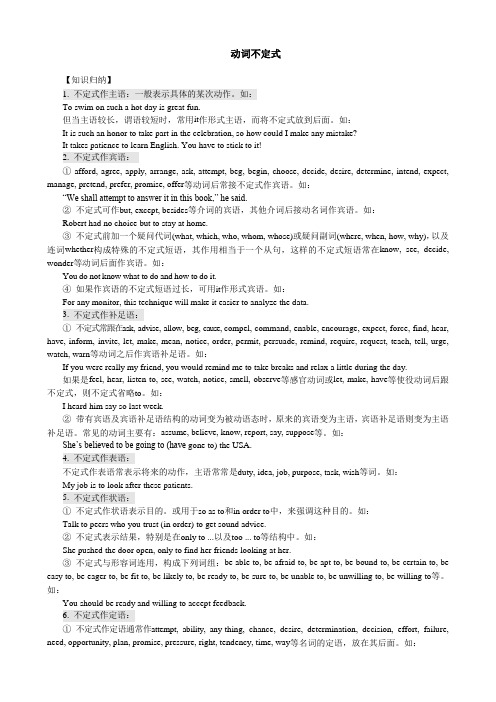
动词不定式【知识归纳】1. 不定式作主语:一般表示具体的某次动作。
如:To swim on such a hot day is great fun.但当主语较长,谓语较短时,常用it作形式主语,而将不定式放到后面。
如:It is such an honor to take part in the celebration, so how could I make any mistake?It takes patience to learn English. You have to stick to it!2. 不定式作宾语:① afford, agree, apply, arrange, ask, attempt, beg, begin, choose, decide, desire, determine, intend, expect, manage, pretend, prefer, promise, offer等动词后常接不定式作宾语。
如:“We shall attempt to answer it in this book,” he said.②不定式可作but, except, besides等介词的宾语,其他介词后接动名词作宾语。
如:Robert had no choice but to stay at home.③不定式前加一个疑问代词(what, which, who, whom, whose)或疑问副词(where, when, how, why),以及连词whether构成特殊的不定式短语,其作用相当于一个从句,这样的不定式短语常在know, see, decide, wonder等动词后面作宾语。
如:You do not know what to do and how to do it.④如果作宾语的不定式短语过长,可用it作形式宾语。
如:For any monitor, this technique will make it easier to analyze the data.3. 不定式作补足语:①不定式常跟在ask, advise, allow, beg, cause, compel, command, enable, encourage, expect, force, find, hear, have, inform, invite, let, make, mean, notice, order, permit, persuade, remind, require, request, teach, tell, urge, watch, warn等动词之后作宾语补足语。
初中英语动词不定式
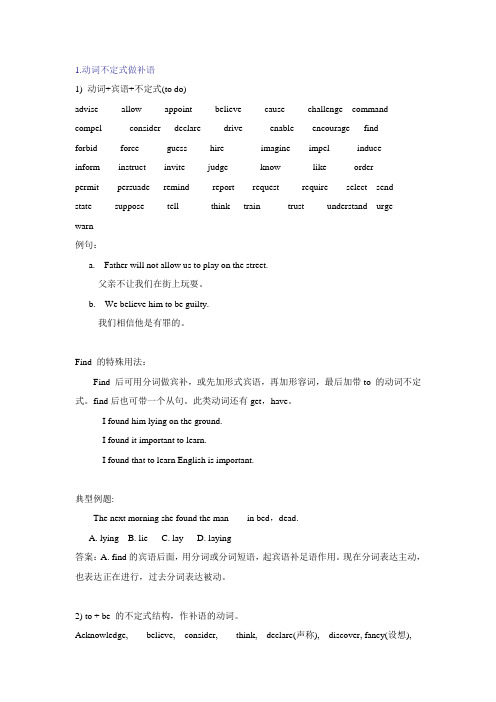
1.动词不定式做补语1) 动词+宾语+不定式(to do)advise allow appoint believe cause challenge commandcompel consider declare drive enable encourage findforbid force guess hire imagine impel induceinform instruct invite judge know like orderpermit persuade remind report request require select sendstate suppose tell think train trust understand urgewarn例句:a.Father will not allow us to play on the street.父亲不让我们在街上玩耍。
b.We believe him to be guilty.我们相信他是有罪的。
Find 的特殊用法:Find 后可用分词做宾补,或先加形式宾语,再加形容词,最后加带to 的动词不定式。
find后也可带一个从句。
此类动词还有get,have。
I found him lying on the ground.I found it important to learn.I found that to learn English is important.典型例题:The next morning she found the man ___ in bed,dead.A. lyingB. lieC. layD. laying答案:A. find的宾语后面,用分词或分词短语,起宾语补足语作用。
现在分词表达主动,也表达正在进行,过去分词表达被动。
2) to + be 的不定式结构,作补语的动词。
Acknowledge,believe,consider,think,declare(声称),discover, fancy(设想),feel find,guess,judge,imagine,know,prove,see(理解), show,suppose,take(以为),understandWe consider Tom to be one of the best students in our class.我们认为汤姆是班上最好的学生之一。
- 1、下载文档前请自行甄别文档内容的完整性,平台不提供额外的编辑、内容补充、找答案等附加服务。
- 2、"仅部分预览"的文档,不可在线预览部分如存在完整性等问题,可反馈申请退款(可完整预览的文档不适用该条件!)。
- 3、如文档侵犯您的权益,请联系客服反馈,我们会尽快为您处理(人工客服工作时间:9:00-18:30)。
常见动词不定式词组、句型用法总结
.固定用法(非谓语动词):以下是带to的动词不定式常见搭配★希望做某事hope to do sth.
★决定做某事decide to do sth
★同意做某事agree to do sth.
★需要某人做某事need to do sth.
★使用某物做某事use sth to do sth
★迫不及待做某事can’t wait to do
★准备做某事get/be ready to do
★尽力/努力做某事try to do sth
★计划做某事plan to do sth.
★希望某人做某事wish sb. to do sth.
★轮流做某事take one’s turns to do sth.
★拒绝做某事refuse to do sth.
★告诉某人做某事tell sb. to do sth.
★请某人做某事ask sb. to do sth.
★想要某人做某事want /would like sb. to do sth.
★不得不have to do
★同意某人做某事agree sb. to do sth.
★教某人做某事teach sb. to do sth.
★喜欢/想要某人做某事like sb. to do sth.
★encourage sb to do鼓励某人做
★帮助某人做某事help sb. to do sth/help sb.do
★It’s one’s turn to do sth. 轮到某人做某事
★It’s time(for sb.) to do sth.是某人做某事时候了
★It’s +adj. for/of sb. to do sth. 对于某人来说做某事是…… ★It takes sb. sometime to do sth. 某人做某事花了某时间
例句: 1.It takes me an hour to get to school by bike.
2.It took me an hour to watch TV last night.
3.It will take her two weeks to finish the work.
★too+adj./adv. to do sth. 太…..而不能
例: He was to angry to say a word.
★find/think/feel it +adj. to do sth.发现/认为/感到做某事是… I find/think/feel it hard to learn English well.
★序数词+to do 第…..个做某事
例句:Who is the first to get there?
★我不知/忘记了怎么办。
I didn't know/forgot what to do.
★离开房间时不要忘记/记住关灯
例句:Don’t forget/Remember to turn off the lights when you left the room
★be+adj+to do sth
例句:I am very sorry to hear that. I am ready to help others. I am happy / pleased / glad to meet you.
顺口溜:本领最多不定式,主表定补宾和状;样样成分都能干,只有谓语它不敢;大家千万要小心,有时它把句型改;作主语时用it,自己在后把身藏;七个感官三使役,宾补要把to 甩开;疑问词后接上它,宾语从句可充当;逻辑主语不定式,不定式前加for sb.;to前not 是否定,各种用法区别开。
以下是不带to的动词不定式(即动词原形)的常见用法
★ let sb. do sth让某人做某事
★ make do sth使得某人做某事
★ hear do sth do sth听见某人做某事
★see do sth do sth看见某人做某事
★why not/why don’t you +动原?为什么不.?Why not/Why don’t you take a walk?
★某人+had better( not)do 某人最好(不)做某事
★情态动词can/may /must /should+ 动词原(包括情态动词的否定形式+动词原形)
★助动词do/does/did/will/would在构成疑问句或者构成否定句即don’t /doesn’t /didn’t /will not /would not+ 动词原形
★ be going to + 动词原形(表示“即将”“打算” 做某事)
使用-ing分词的几种情况
1.在进行时态中。
He is watching TV. They were dancing at nine o'clock last night.
2.在there be结构中。
如:There is a boy swimming in the river.
3.在have fun/problems结构中。
如:We have fun learning English this term.
They had problems getting to the top of the mountain.
4.在介词后面。
如:Thanks for helping me. Are you good at playing basketball?
What /How about doing sth? 做某事怎么样?
I am interested in playing football.
5.在以下结构中
1. enjoy doing sth 喜欢做某事;
2. finish doing sth;完成做某事;
3.feel like doing sth 想要做某事;
4. stop doing sth 停止做某事(原来的事)
5.forget doing sth 忘记做过某事
6. go on doing sth 继续做某事(原来的事);
7.remember doing sth 记得做过某事
8. like doing sth 喜欢做某事;
9.find /see/hear/watch sb doing发现/看到/听到/观看某人做
10. try doing sth 试图做某事;
11. need doing sth 需要做某事;
12. prefer doing sth 宁愿做某事;
13.mind doing sth 介意做某事;
14. miss doing sth 错过做某事;
15.practice doing sth 练习做某事;
16. be busy doing sth 忙于做某事;
17.can't help doing sth 禁不住做某事;
18.waste time/money doing 浪费时间/钱做;
19.keep sb.doing 让…始终/一直做…
20. stop sb.(from)doing 阻止某人做某事
21. prefer doing A to doing B=like A better than B喜欢做B更喜欢做A
22. “do some +doing”短语
如:do some shopping/do some washing/do some reading/do some practicing/do some cleaning/do some speaking
23.“go doing”短语去做某事(主要指文娱活动等)
如:go shopping/go fishing/go swimming/go hiking/go skating/go camping/go skiing(滑雪/go boating /go hunting (打猎)
.注意动词的过去分词的常见搭配:
I feel(am/was) excited/ surprised/ amazed /interested /tired/pleased/worried/lost
Keep…closed/ a boy called/named Tom。
